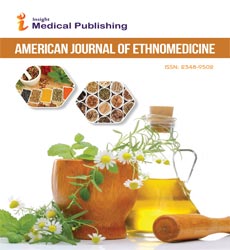ISSN : 2348-9502
American Journal of Ethnomedicine
Health Benefits of Tulsi in Our Daily Life
Juming Phair*
Department of Andrology, Guangdong Provincial Hospital of Chinese Medicine, Zhuhai, China
- *Corresponding Author:
- Juming Phair
Department of Andrology,
Guangdong Provincial Hospital of Chinese Medicine,
Zhuhai,
China
E-mail: Jumingphair@gmail.com
Received Date: November 04, 2021; Accepted Date: November 18, 2021; Published Date: November 25, 2021
Citation: Phair J (2021) Health Benefits of Tulsi in Our Daily Life. Am J Ethnomed Vol.8 No.10:004.
Description
Tulsi is a plant in all over India. Ocimum tenuiflorum (Tulsi) is an aromatic plant of the mint family. It is an upright, wellbranched, 3060 cm high sub-shrub with hairy stems and simple, contralateral green leaves with a strong scent. Tulsi plays an important role in our daily lives and is considered as a queen of herbs. It is the most common household plant in India and is sacred in the hindu tradition. Many hindu epics explain the meaning, characteristics, and usage of tulsi. Tulsi is an upright, sweet-scented shrub that grows to a height of 3-5 feet. It is widely cultivated around gardens and temples. It has a spicy taste and aroma. It is the only plant that can absorb carbon dioxide throughout its life. It releases oxygen early in the morning and is bene icial for people with respiratory distress. Tulsi plants are very important to humankind because of their diverse medicinal properties. Tulsi leaves are widely used in the production of Ayurvedic medicine. It is known to promote longevity in life.
Benefits of Tulsi Leaves
Healing power
Tulsi plants have many medicinal properties. The leaves act as a nerve tonic and sharpen the memory. They promote the removal of catarrhal substances and mucus from the bronchi. The leaves strengthen the stomach and cause excessive sweating. The seeds of the plant are slimy.
Fever and common cold
Basil leaves are unique to many heats. During the rainy season, when malaria and dengue fever are widespread, the so t leaves boiled with tea are effective in preventing these diseases. For acute heat, the temperature drops when cardamom powder is added in 0.5 litres of water. The boiled leaves are then decocted and mixed with sugar and milk. Juice from tulsi leaves can be used to reduce heat. Extracts of tulsi leaves in fresh water should be given every 2-3 hours. In the meantime, you can drink cold water at any time. Lowering body temperature is very effective for children.
Coughs
Tulsi is an important ingredient in many Ayurvedic cough syrups and expectorants. It helps to mobilise mucus in bronchitis and asthma. Chewing tulsi leaves will relieve colds and flu.
Sore throat
If you have a sore throat, you can drink hot water with basil leaves as a drink. This water can also be used for gargling.
Respiratory disorder
Herbs help treat respiratory illnesses. Decoction of leaves with honey and ginger is an effective treatment for bronchitis, asthma, flu, coughs, and colds. If you get the flu, decoctions of leaves, cloves, and table salt are immediately reassuring. Boil in 0.5 litres of water until the remaining water is halved, then add and remove.
Kidney stone
Basil has a tonic effect on the kidneys. For kidney stones, basil leaves and honey juice are excreted from the urinary tract when taken regularly for 6 months.
Heart disorder
Basil has a beneficial effect on heart disease and its consequent weakness. It lowers cholesterol levels in the blood.
Children's ailments
Common pediatric problems such as coughs, colds, fevers, diarrhea, and vomiting respond positively to basil leaf juice. If chickenpox pustules delay their appearance, basil leaves containing saffron speed them up.
Stress
Basil leaves are considered "adaptogens," or anti-stress agents. Recent studies have shown that, leaves provide important protection against stress. Even healthy people can chew 12 basil leaves twice a day to avoid stress. It helps cleanse the blood and prevent some common factors.
Mouth infections
The leaves are ineffective against mouth ulcers and infections. Some chewed leaves cure these conditions.
Skin disorders
Topically applied basil juice is beneficial in the treatment of ringworm and other skin disorders. It has also been successfully treated by several naturopathic doctors for vitiligo.
The paper concludes that, modern scientific research on tulsi demonstrates many psychological benefits of consuming tulsi and demonstrates the wisdom inherent in Hinduism and Ayurveda, idolization tulsi as a plant that can be worshiped, ingested, transformed into tea, and used for medicinal purposes and spiritual purpose in everyday life. With a focus on ethical, sustainable and eco-friendly farming practices that provide livelihoods for thousands of farmers, growing tulsi goes beyond benefits for individuals of households and begins to solve social, economic and environmental problems.
Open Access Journals
- Aquaculture & Veterinary Science
- Chemistry & Chemical Sciences
- Clinical Sciences
- Engineering
- General Science
- Genetics & Molecular Biology
- Health Care & Nursing
- Immunology & Microbiology
- Materials Science
- Mathematics & Physics
- Medical Sciences
- Neurology & Psychiatry
- Oncology & Cancer Science
- Pharmaceutical Sciences
